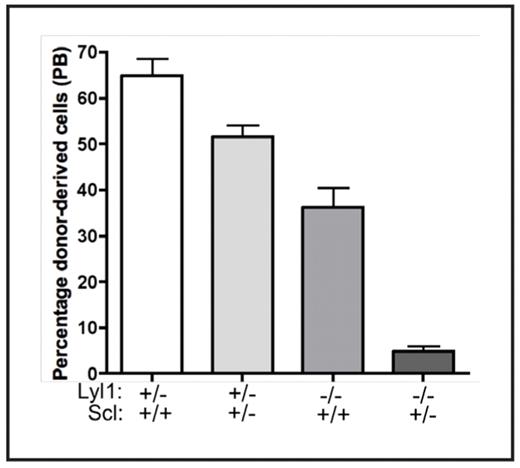Abstract
The Stem Cell Leukemia gene (Scl) and the Lymphoblastic Leukemia gene 1 (Lyl1) genes encode two related basic-helix-loop-helix transcription factors that are involved in T-cell acute lymphoblastic leukemia via chromosomal translocations or aberrant expression due to other genetic or epigenetic abnormalities. Previous studies have shown that Scl is necessary for embryonic hematopoiesis and erythropoiesis, but dispensable for adult hematopoietic stem cell (HSC) function. Lyl1 on the other hand is important for adult HSC function and B-cell development. In order to elucidate in more detail the functions of Lyl1 and Scl in adult HSCs, we generated double knock-out mice and studied the function of their HSCs. Double knock-out mice demonstrate a striking genetic interaction between the two genes, with a clear dose-dependence for the presence of Scl or Lyl1 alleles for HSC function.
Specifically, we carried out competitive fetal liver transplantation assays using mice with different combinations of Lyl1 and Scl alleles and analyzed their potential to repopulate the bone marrow of recipient mice. Peripheral blood chimerism of recipient mice shows that HSC function is lost with progressive loss of Lyl1 or Scl dosage, suggesting an overlap of function of the two genes in the HSCs (Figure)
We have further investigated the function of Lyl1 and Scl in adult hematopoiesis by generating Lyl1/Scl-conditional double knock-out mice and studied adult HSC function measured by bone marrow repopulation assays. Donor engraftment dramatically decreased after deletion of the floxed Scl allele, demonstrating rapid loss of adult HSC function. Furthermore, Scl deletion in a Lyl1−/− background causes hematopoietic progenitors to rapidly undergo apoptosis in a cell-intrinsic fashion. These results demonstrate that at least one allele of either Lyl1 or Scl must be present for adult HSC survival, and show that their functions partly overlap in HSCs, suggesting that Lyl1 and Scl are crucial regulators of adult, as well as embryonic, hematopoiesis.
Disclosures: No relevant conflicts of interest to declare.
Author notes
Corresponding author


This feature is available to Subscribers Only
Sign In or Create an Account Close Modal